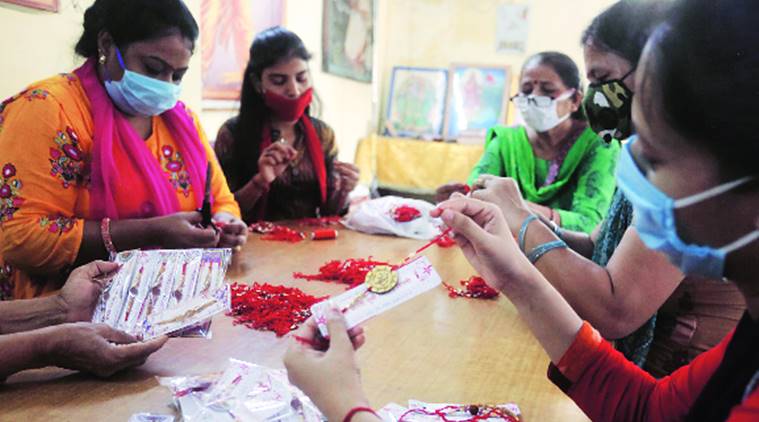 At the Sewa Bharti centre in Khichripur. (Photo: Amit Mehra)
At the Sewa Bharti centre in Khichripur. (Photo: Amit Mehra)
At a three-storey building in Khichripur on Saturday, around 20 women sat in a hall on the top floor, putting together threads, beads and other craft material to make rakhis.
The ground floor of the same building is used to train children in how to use a computer, while another is dedicated to training mostly young girls in stitching. There are roughly 500 volunteers.
This is one of the centres of the RSS-affiliated Sewa Bharti, whose volunteers are currently involved in Covid relief efforts across the country.
The relief effort, which in its early days involved distribution of dry ration, food packets and masks, has slowly given way to helping those who need urgent medical attention or have lost their livelihoods, with 5,07,655 volunteers engaged in the process across the country, a senior functionary said.
In the national capital 12,500 volunteers are engaged in 179 locations. “We were initially working in riot-affected areas where the problem was similar — of people needing food and medical facilities — so we continued our operations,” Ram Kumar, general secretary of Sewa Bharti’s Delhi arm, said.
“With time, people’s needs have changed,” he said. “Initially, it was ration and cooked food, then it was helping migrants. But now it is employment, blood, plasma and isolation centres that we are focusing on. For instance, we are getting rakhis made by women of several slums in the city to help them earn a livelihood.”
At the Khichripur branch, around 1,000-plus rakhis are made by 22 volunteers, who get Rs 4 per piece.
Rekha, 21, a student of the School of Open Learning at Delhi University and a resident of Khichripur, is one such volunteer. She said she has also learnt a computer course at the centre, and hopes to use the skill to land a job — or set up her own business.
Anita Devi, a teacher at the centre for a decade now, said several women from the vicinity have taken such training courses and are self-dependent now.
In the coming months, volunteers will shift focus to making candles and earthen lamps, with an emphasis on giving a push to locally made products instead of relying on Chinese ones.
Nirbhay Shankar, the branch secretary, said the centre was started in the early 1990s to provide training in stitching, bangle-making and later in computer courses. “Since Covid, many of our swayamsevaks (volunteers) have not been not coming as the stitching training has been temporarily halted, so we have decided to train women in rakhi-making. The rakhis are collected from around 40 such centres across Delhi and sent to our head office near Gole Market, which looks after the marketing and selling.”
A senior RSS functionary of the Delhi unit said the organisation is also in talks with private firms to provide vocational training to the poor who have lost jobs, so they may have another chance at earning a livelihood.
Similar outreach, a senior functionary said, is being carried out across the country — one in every three volunteers of the Sewa Bharti is currently involved in Covid relief efforts in South India, with 1.73 lakh foot soldiers working in Karnataka, Tamil Nadu, Kerala, Telangana and Andhra Pradesh.
“We have a volunteer base across India, including in the most remote parts. During the Kerala floods, too, our volunteers had helped people,” said Parag Abhyankar, a senior functionary of the Sewa Bharti, which was founded in 1989 and works on healthcare, education, vocational training among the poor and outreach among slums and resettlement colonies.
As part of its relief operations during the pandemic, the organisation touched across 92,000 locations.
The organisation, a senior functionary said, also donated ration kits to over 73 lakh families and meal packets to over 4.5 crore people, with 60,000 volunteers also donating blood.